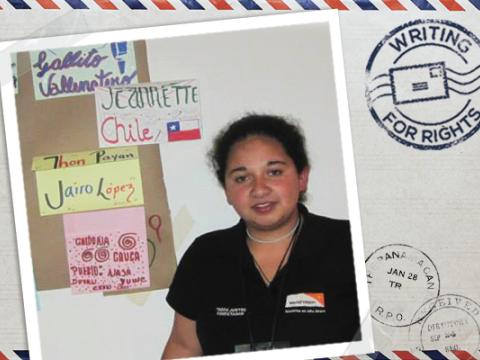Writing for Rights: Jeannette, 17, Chile

My name is Jeannette, and I am from a small town in southern Chile. Our town has a strong coal-mining tradition and a reputation for being sexist. According to the National Institute of Statistics of Chile, I am part of the 14.45 per cent of girls between 0 and 19 years-of-age who are living in a situation of gender inequality. I was born when Chile had signed the Convention on the Rights of the Child and grew up memorising those rights, but in reality I thought those rights were more for boys than for girls.
As the eldest of three children, it has been always my responsibility to help out around the house and take care of my younger brother. He is 5 years old and calls me Mom Jani – it does not bother me at all, but I also understand that it is not my role to be the mother. It is something I have to do.
I do not know exactly what my path will be in the future, but today I know that I have as many rights as anyone else. I’m worth the same as a man.
To be realistic, girls are given fewer opportunities than boys. Even when we are babies society forces us to be identified by the colour of our clothing and to behave in specific ways according to our gender. We even have to be proud of the piercings of our ears, just hours after we are born, just because we were girls.
I have also always wondered why adults tend to generalise both genders with the word niños (boys)? We always feel the pressure to be identified by the male gender. Wouldn’t it be fairer to say boys and girls, not only boys? Why don’t people take the time to say president, doctor, architect and many other words with the female word? Otherwise it seems like the words and names were made just for males.
These are some of the many questions that worry me, because I grew up like many other girls with the idea that just because we were women we had fewer rights than men.
This situation worsens when we are teenagers. Only a decade ago schoolgirls who fell pregnant were pressured to drop out of school or were simply expelled. Fortunately, pregnant teenagers now have counselling, access to nurseries for their babies and support to continue their education in a more flexible way. They are now given opportunities to study and become professionals while they carry out the responsibilities of motherhood. Despite the need to carry new roles, these young mothers also remain girls and they must enjoy all the rights granted under the convention.
Of course, in order to make a change, this must be made globally, involving the education system, the state, public health and even the family, so that from the nucleus of society we can promote equal rights and opportunities for all. This way, girls could help in their homes, not being required to be a teen mom just for being a female, but as a way of contributing to the family.
I would like it if girls do not grow thinking that when they are adults they need to get married and have children as the only goal in life. I also thought that my life would be like that, but when I began to realise that women have the same value as men and we are able to do things and move forward, then my goals started to be different.
This year marks the 25th anniversary of the Convention on the Rights of the Child, and I would like people to tell of the convention of the BOY and the GIRL. I think this is a way of levelling the playing field and convince all the girls that they have equal rights like men. In my case I feel very fortunate because I have met people who also believe that we girls have the same abilities as everyone and we can reach our dreams. This has opened my mind, and I have started to trust my abilities and strengths. I joined a Children’s Club, and I became the spokeswoman of this group of children and youth in my hometown. There I found many young people like me who want to change the world for good.
I do not know exactly what my path will be in the future, but today I know that I have as many rights as anyone else. I’m worth the same as a man, and the Convention on the Rights of BOYS and GIRLS has helped me to know that.
In my country we have a woman as the president of the Republic. This makes me believe that there are neither limits nor restrictions for this generation of girls. There are only some cultural issues that we need to improve all together as a society to enforce the convention fully and to achieve what we crave … true gender equality.
By Jeannette, 17-years-old, Chile